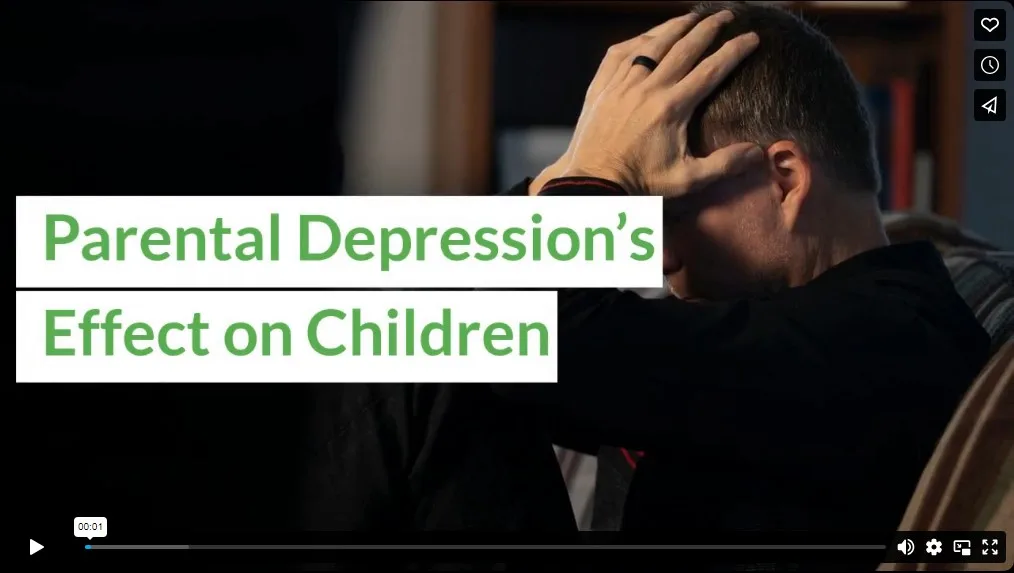Depression is a mental health problem that affects every aspect of your life. It can be debilitating, making it hard to get out of bed, do laundry, and cook for yourself. If children are a part of your life, it can have unfortunate effects on their lives and development. Here are some of the issues researchers have found children of depressed parents face:
Caretaker Burden
Since they want to help when their loved one is struggling, children often step into duties that you are struggling with as the parent. They will be taking on jobs that are beyond their years, especially if they have younger siblings, including making meals and cleaning the house.
They can feel powerless about not being able to fix your depression. They may also feel anxiety and fear about your mental health degrading. They may express this with anger or irritation. It can become shame and guilt for getting upset with you, especially if they understand your illness. Children can also resent doing so much or caring for you when their friends don’t have the same responsibilities. All of this affects their relationships, not just the one with you.
Poor Social Relationships
Unfortunately, parents struggling with mental health problems are more likely to engage in negative parenting behaviors. You may unintentionally withdraw and ignore your children, not meeting their emotional or physical needs or becoming more critical, hostile, or abusive. Depression dulls your senses, making you less sensitive or responsive to your children’s cues. Untreated depression won’t let healthy parent-child relationships develop, which can have lifelong effects on your children.
If a child’s primary relationship is unsteady or insecure, they will struggle to trust and connect with peers. It can be worse if they’ve had to take on more responsibilities in the home, acting like a mature, mini adult on the surface. They are operating well beyond their peer group’s age but missing the vital time to learn how to make social connections. Underneath, they are often insecure, scared, or anxious, desperately wanting attachments and affection but unable to connect. When you are withdrawing, it’s worse, limiting their social network for both of them.
Behavioral Problems
Children thrive with routines, boundaries, and when their needs are met, such as getting balanced meals, enough sleep at appropriate times, and unconditional love. They will act out when they are not getting these things consistently at home. Younger children may be extra clingy, have slower language development, and struggle to problem-solve or regulate their emotions. This all leads to more tantrums and lashing out physically with hitting or biting.
The problems might manifest differently in older children. Typically, a child acting out is a cry for help. They are begging for attention and boundaries in the only way they know how, even if they don’t realize it.
School Struggles
In addition to social struggles and behavioral problems, children can struggle academically. They may arrive late, without breakfast, or miss school entirely depending on their age, ability to get themselves ready and to school, and the severity of depression. If you are a parent battling depression, you are less likely to motivate them scholastically. You won’t be available to help them with homework, keep track of their assignments or projects, or get them additional assistance if their grades suffer.
Developing Mental Health Problems
Because of unmet needs, poor school performance, trouble with relationships, and genetic factors, children of depressed parents have poorer outcomes than their peers: they are more likely to have negative self-images, show signs of attention deficit hyperactivity disorder (ADHD), develop anxiety and depression disorders themselves, and have higher substance use rates in adolescence.
Early Diagnosis and Depression Treatment Is Crucial
The sooner you get help, the more you minimize the potential effects of your depression on your children. Kids are incredibly resilient, and early intervention can help break the cycle of mental health issues in your family. Antidepressants, cognitive behavioral therapy, counseling, and family therapy are all excellent places to start tackling your depression. Magnetic brain stimulation for depression, also known as TMS or transcranial magnetic stimulation, is another treatment option for quicker results without systemic side effects.
Be aware of your warning signs and triggers for a depressive state, so you can take steps to prevent a relapse. Additionally, be mindful of signs that your children may be beginning to struggle with depression: a sudden change in temperament or attitude, differences in their sleep or eating habits, withdrawal, agitation, or complaining of frequent headaches or stomach aches.
A diagnosis of depression is a lifelong health issue, and the sooner you or your loved ones get help, the easier it is to find remission. Speak to your doctor if you are concerned about yourself or someone in your family. Getting help will go a long way to help the health of your entire family.
Infographic
Depression is a mental health condition that can have an impact on many facets of your life. If the sickness is disruptive, it could be difficult to get out of bed. Your interactions with kids might harm their growth and well-being. The following problems may affect kids of depressive parents, according to research.

Video

